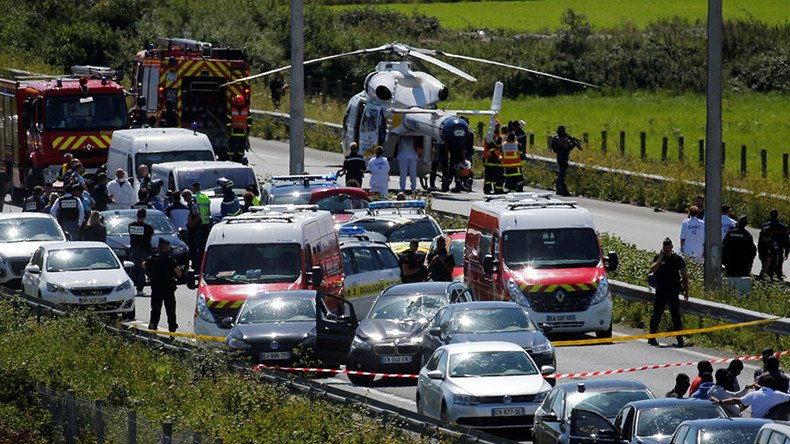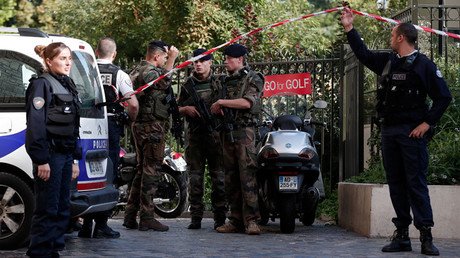French troops hit by vehicle: ‘Good behind the scenes intelligence work needed to stop attacks’

To stop attacks more investment in preemptive intelligence work is needed instead of drowning in data about ordinary people. The security agencies should target those who should be under active investigation, says former MI5 intelligence officer Annie Machon.
French counterterrorism prosecutors are investigating an attack on soldiers near their barracks in a northern suburb of Paris Wednesday morning. Six troops were injured, three of them seriously after being hit by a vehicle.
The soldiers who were attacked are part of Operation Sentinelle, the extra security brought in after a series of terror attacks in France two years ago.
The incident took place in Levallois-Perret commune a northwestern suburb of Paris, the local police prefecture said.
Police said they intercepted a vehicle and arrested the suspect after firing shots to “neutralize” the alleged attacker.
The suburb's mayor said the suspect was waiting for the soldiers to emerge for hours. RT asked Annie Machon’s view on how such suspicious activity went unchallenged.
“If this alleged attacker was indeed lying in wait for quite a long time, right next to a very sensitive and key site for the security services, then one does have to wonder what it going on. I know France is not yet blanketed in CCTV coverage as the UK is. But I would have thought there would be CCTV around army barracks, particularly the counterterrorism army barracks,” she said.
Machon said it’s too early to jump to conclusions but “this does fit a pattern of ISIS inspired attacks against the security services in France."
“I would also suggest there is a high probability that if that is the case this person will already be known to the security agencies. We’ve seen time after time with all the attacks across Europe over the last couple of years that every one of the perpetrators has already been on the radar of the security agencies. Because they are drowning in the data they are hoovering up about all of us, they are not targeting the people that should be under active investigation,” Machon said.
In Machon’s opinion, the Operation Sentinelle and the state of emergency that's been in place since 2015 haven’t been really successful “if this plot is still going on.”
“I think Operation Sentinelle is more to reassure the public. But actually, to stop attacks you need good behind the scenes intelligence work where you get the preemptive intelligence - you know what people are planning, you can stop them carrying out their plots before they actually do them. This is more of a reassurance type of thing putting all the soldiers on the streets. However, France has a very strong constitution with the ideas of privacy and right to private life and to feel secure at home. This state of emergency has basically shredded that constitution, shredded those basic rights. At a great cost to society. Perhaps it is not quite doing what it should be doing. There should be more investment in proper intelligence work. There should be more targeting of people you can recruit as agents out there within these groups to get the preemptive intelligence,” Machon said.
You must put security forces on the street. To be seen to be acting in opposition to the threat to the country. But in so doing, as demonstrated here, you are providing them [attackers] with any number of targets. If they are not after specific buildings, they are not after particular individuals who are prominent in public life but are prepared to attack the security forces themselves; it becomes a very difficult thing to deal with. - Roger Gray, UK police firearms consultant
Chris Hunter, former UK Army intelligence officer, argues that it is very difficult to do anymore to prevent this type of attacks.
“We’ve seen repeated calls for ‘vehicle jihad’ as they call it from both ISIS and Al-Qaeda,” he said in a comment to RT.
However, he added, certain things could be done, such as “looking at not setting patterns by the security forces, putting protective security measures – counter-surveillance during sort of vulnerable periods and vulnerable locations.”
“Certainly education and training of the general public is something woefully inadequate across Europe, and a lot more could be done to make the public aware of terrorist tactics, techniques, and procedures. Because I think people do want to know how they should act, what to identify and how to report it,” Hunter said.
The statements, views and opinions expressed in this column are solely those of the author and do not necessarily represent those of RT.













